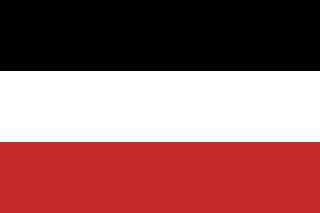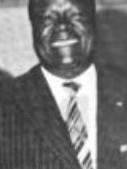
The Republic of Upper Volta was a landlocked West African country established on 11 December 1958 as a self-governing colony within the French Community. Before becoming autonomous, it had been part of the French Union as the French Upper Volta. On 5 August 1960, it gained full independence from France. On 4 August 1984, it changed its name to Burkina Faso.

The national flag of Burkina Faso is formed by two equal horizontal bands of red (top) and green, with a yellow five-pointed star resting in the center. The flag was adopted on 4 August 1984. The flag uses the Pan-African colours of Ethiopia, reflecting both a break with the country's colonial past and its unity with other African ex-colonies. The red is also said to symbolize the revolution and the green the abundance of agricultural and natural riches. The yellow star placed over the red and green stripes represents the guiding light of the revolution. The flag was adopted following the coup of 1983 which brought Thomas Sankara to power.

The coat of arms of Burkina Faso contains a shield based on the national flag. Above the shield the name of the country is shown, while below it is the national motto, Unité, Progrès, Justice. The supporters are two white stallions. The two plants emerging from the lower banner appear to represent pearl millet, an important cereal grain cultivated in this country where agriculture represents 32% of the gross domestic product. This coat of arms is similar to the old Upper Volta coat of arms, with the Burkina Faso flag replacing the Upper Volta flag in the middle. The coat of arms and its meaning is mandated by Law No 020/97/II/AN.

The Mars Volta is an American progressive rock band from El Paso, Texas, formed in 2001. The band's only constant members are Omar Rodriguez-Lopez and Cedric Bixler-Zavala, whose partnership forms the core of the band. The band's current line-up also includes founding member Eva Gardner (bass), Omar's brother Marcel Rodriguez-Lopez, pianist Leo Genovese and Linda-Philomène Tsoungui (drums)

The Regions of Ghana constitute the first level of subnational government administration within the Republic of Ghana. As of 2020, there are currently sixteen regions, which are further divided for administrative purposes into 260 local metropolitan, municipal and district assemblies.
The 1978 African Cup of Nations was the eleventh edition of the Africa Cup of Nations, the football championship of Africa (CAF). It was hosted by Accra and Kumasi, Ghana. The format of the competition changed from 1976: the field of eight teams was still split into two groups of four, but the final group stage was eliminated in favor of the knockout semifinals used in tournaments prior to 1976. Ghana won its third championship, beating Uganda in the final 2−0.

The Gambia national football team represents The Gambia in men's international football and is controlled by the Gambia Football Federation. Until 1965, the team and the country were known as British Gambia. The team has never qualified for the World Cup. In 2021, Gambia qualified for the Africa Cup of Nations finals for the first time in history. The team represents both FIFA and Confederation of African Football (CAF).

Voltaic Union was a political party in Upper Volta. It was formed soon after World War II on the initiative of the French governor Albert Mouragues, and Mouragues was accused of interference in the June 1948 local elections on behalf of the party. Also known as the Union pour la Défense des Interêts de la Haute Volta (UDIHV), it was an alliance of young Catholic-trained Voltaics and traditional chiefs opposed to domination by the Ivory Coast. Early members included Joseph Conombo, Henri Guissou, Joseph Ouedraogo and Maurice Yaméogo.

Gérard Kango Ouédraogo was a Burkinabé statesman and diplomat who served as Prime Minister of Upper Volta from 13 February 1971 to 8 February 1974. He was subsequently President of the National Assembly of Upper Volta from October 1978 to November 25, 1980.

Islam in Burkina Faso has a long and varied history. According to the 2010 census, the population of the country is 63.2% Muslim.

The Republic of Upper Volta competed at the 1972 Summer Olympics in Munich, West Germany. This was the first and only time the country participated under that name at the Olympic Games. However, the first Upper Voltan athletes took part in the Olympics at the 1924 Games as part of the French contingent. André Bicaba was the only athlete representing Upper Volta in 1972, who participated in the men's 100 metres but did not progress past his heat. Upper Volta initially sought to send athletes to the 1976 Summer Olympics, but boycotted it with other Africa nations. By the time it returned to the Games in 1988, the nation was known as Burkina Faso.

Upper Volta was a colony of French West Africa established in 1919 in the territory occupied by present-day Burkina Faso. It was formed from territories that had been part of the colonies of Upper Senegal and Niger and the Côte d'Ivoire. The colony was dissolved on 5 September 1932, with parts being administered by the Côte d'Ivoire, French Sudan and the Colony of Niger.
The Volta Glacier is located in Mount Aspiring National Park in the Southern Alps of the South Island of New Zealand.

This is a survey of the postage stamps and postal history of Burkina Faso, known as Upper Volta until July 1984.
Laurent Banadi is an Upper Volta football defender who played for Upper Volta in the 1978 African Cup of Nations. He played for Rail Club du Kadiogo.
On 4 August 1983 a coup d'état was launched in the Republic of Upper Volta in an event sometimes referred to as the August revolution or Burkinabé revolution. It was carried out by radical elements of the army led by Thomas Sankara and Blaise Compaoré, against the regime of Major Jean-Baptiste Ouédraogo. Ouédraogo had been brought to power in a 1982 coup with the Conseil de Salut du Peuple (CSP), a body composed of military officials of different ideological backgrounds. The CSP chose Sankara as Prime Minister of Upper Volta in January 1983. As his tenure progressed, Ouédraogo found himself unable to reconcile the conservative and radical factions of the CSP, whose disagreements were leading to a political stalemate. On 16 May he purged his government of pro-Libyan and anti-French elements, disbanded the CSP, and had Sankara and several other important officials arrested. This move sparked discontent among Sankara's supporters. Sankara was eventually released while one officer, Compaoré, began to organise military resistance to the government.
The 1974 Upper Voltan coup d'état was a bloodless military coup which took place in the Republic of Upper Volta on 8 February 1974.










